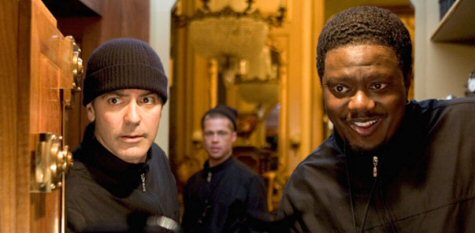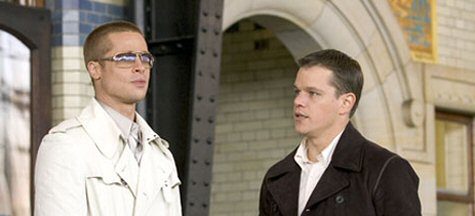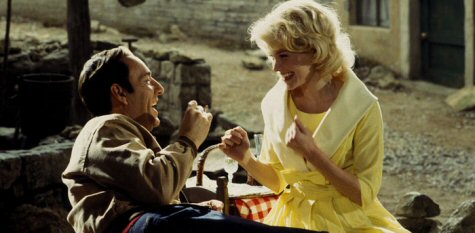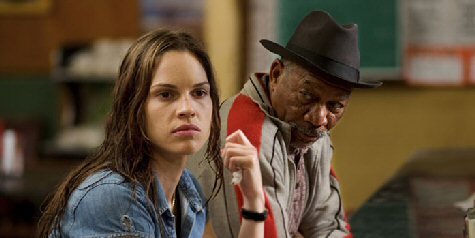Bulletin from a big-name regional critic: “I have been pestering the hell out of my [distant city]-based WB rep for a screening of Million Dollar Baby in [nearby city] before my Top Ten list is due, and have been told more or less that it likely won’t happen. I was invited to see it later this week in [far-away city]: a five-hour roundtrip drive on a day when I’ve already got two screenings to attend here. Thanks much. Considering that his last was Mystic River, Clint Eastwood is getting fucked by his long-time studio on this one.”
Month: December 2004
And so the question, with
And so the question, with four respected critic groups (from NYC, L.A., Boston and San Francisco) having given their Best Picture awards to Alexander Payne’s excellent Sideways: what happened to the supposed impact grenade of Clint Eastwood’s Million Dollar Baby? These critics groups are obviously exhibiting deep-rooted admiration for Payne’s film, which I concur with, but Eastwood’s boxing drama was supposed to be the big Last Minute Wow that was staggering critics of consequence…but this hasn’t been evidenced so far by a Best Picture win. (Although Eastwood himself has won the NYFC’s Best Director award, so that’s something.) I guess this simply means that critics liked Payne’s film just a little bit more, and (who knows?) maybe they were also reacting on some level to that mentally-handicapped kid in Eastwood’s film. Baby will certainly be Oscar nominated and, I still predict, take the Best Picture Oscar. And by the way, Tom O’Neill…? What’s been happening with your beloved Aviator with the critics so far? Flatlining!
Righteous vision sometimes pokes through:
Righteous vision sometimes pokes through: Sideways has won the Best Picture award from the New York Film Critics Circle, which makes it…what?…four such honors over the last two days from critics orgs (L.A., New York, Boston, and San Francisco.) Sideways sad-sack Paul Giamatti has won the New York Film Critics Circle award for Best Actor, and his costar Virginia Madsen has nabbed the NYFCC’s Best Suporting Actress award, adding to the identical honor she was given last Saturday by the Los Angeles Film Critics Association. Vera Drake‘s Imelda Staunton has been handed the NYFCC’s Best Actress award following Saturday’s LAFCA trophy for the same achievement. Clive Owen…yes!….has taken the NYFCC’s Best Supporting Actor award for his acting in Closer, and Pedro Almodovar’s Bad Education has been given the Best Foregin Film Award.
This is just Monday-morning quarterbacking
This is just Monday-morning quarterbacking and by no means a critical issue, but Alexander Payne’s Sideways wasn’t quite as favored to win the Best Picture award from the Los Angeles Film Critics Association last Saturday as much as Clint Eastwood’s Million Dollar Baby was, although the undeniably first-rate Sideways took the prize in the end. Now there are hints that Warner Bros. publicity may not have pushed hard or early enough with M$B screenings. Two critics who attended the LAFCA gathering on Saturday (at the home of Variety and Film Week critic Lael Lowenstein) say that LAFCA president Henry Sheehan announced just before Saturday’s Best Picture balloting that as of the previous Thursday morning (12.9), a Warner Bros. publicist had told him that among LAFCA’s 46 members, 20 had not at that point seen Million Dollar Baby. And yet later that day DVD screeners of Eastwood’s film were messengered to critics’ homes, and then an all-media showing happened Thursday night at the Grove, so you’d think everyone would have seen it one way or the other. But a lot of journos are lazy and every publicist knows this, and you’d think to be on the safe side WB would not have waited until 48 hours before the LAFCA voting to make sure everyone had caught it. Both LAFCA critics I spoke to (neither of whom was Sheehan, whose only comment was that he was “surprised” that Sideways won) said that a LAFCA member said in the wake of Sheehan’s announcement that Warner Bros. “didn’t make it easy for us” to see M$B. 36 LAFCA members attended Saturday’s voting session, although some absentees (like L.A.Times critic Kenneth Turan) registered their vote by proxy.
Hats in the air for
Hats in the air for Sideways grabbing two Best Picture awards, from the L.A. Film Critics and New York Online Film Critics. And cheers to Thomas Haden Church, the film’s amiable, clueless horndog, for scoring two Best Supporting Actor awards from the same groups. And a pat on the back for Sideways director Alexander Payne also being toasted by LAFCA for his work, and to Payne and Jim Taylor for winning the Best Screenplay trophy, and Liam Neeson for winning LAFCA’s Best Actor award for Kinsey, and Imelda Staunton for winning…my God, I’m boring. Virginia Madsen won LAFCA’s Best Actress award, and….I can’t do this. But it’s all great. Hooray for everyone who won.
Gold Derby.com’s Tom O’Neill has
Gold Derby.com’s Tom O’Neill has written an attack piece on the New York Film Critics Circle in the Arts and Leisure section of Sunday’s (12.12) New York Times. One of his big blasts is that the NYFCC “has fared terribly” when it comes to predicting Oscar’s Best Picture, although they agreed with the Academy last year in giving their top trophy to The Lord of the Rings: The Return of the King. The NYFCC’s last Oscar synch-up before that was giving their Best Picture award to Schindler’s List in ’93, and two years before that to The Silence of the Lambs. But hold on, Tom. Isn’t the NYFCC’s marching to a beat of different drum, all things considered, a good rather than a bad thing? Wouldn’t the NYFCC’s choices be regarded askance if they matched up too often with the Academy’s?
The scariest alien invasion movie
The scariest alien invasion movie of recent years, no question, was Shyamalan’s Signs, which was almost entirely about omens, shadows and bumps in the night. And here comes Steven Spielberg’s War of the Worlds (Paramount/DreamWorks, 6.29.05), his third movie about aliens visiting earth, and the first thing I get from the new teaser is obviousness and deja vu. I’m speaking of those middle-American families standing in their nightgowns and bathrobes on a small-town neighborhood street at night, looking with concern at those flashing sky lights in the clouds on the far horizon. I thought right away of those flashing sky lights in the clouds above Melinda Dillon’s home in the early stages of Spielberg’s Close Encounters of the Third Kind.
And yet (this is a
And yet (this is a surprise) I’m told that the middle-American milieu stuff in the War of the Worlds teaser is essentially horseshit because they’re not in the movie and don’t really represent the film at all. As was reported in a recent New York Times story about the Worlds shoot in Bayonne, New Jersey, Spielberg has gone to great lengths to avoid suburban settings. Tom Cruise’s character is a longshoreman, the movie takes place in rusted old working-class Newark neighborhoods, and, I’m told, out in the countryside. So Worlds, it appears, couldn’t be further from Close Encounters. It’s also weird that the trailer has images of Paris and London and whatnot, since the film, I’m hearing, never strays from Cruise’s character’s limited viewpoint.
And by the way, the
And by the way, the Worlds marketing slogan is, “They’re Already Here.” As in hidden amongst us, preparing to strike, etc. Is anyone else hearing an echo? Just as the 1953 George Pal War of the Worlds was, in the vein of The Thing and other alien invasion movies of that period, a metaphor for a feared Communist takeover, the metaphor in Spielberg’s film is…well, think about it. But it’s not what you might think. If you read H.G. Wells’ novel, which was an allegory about the demise of the British empire, it can be deduced that the Spielberg film isn’t about fear of Osama bin Laden but our waging of the Iraqi War. Remember how the aliens die in the George Pal film, from breathing our air and not being able to cope with the infections? This comes straight from Wells, who was trying to show how British colonialists could invade less technologically-advanced cultures and completely dominate them, but would eventually, over time, be driven out by indigenous factors like disease (in the case of Africa) or local insurgencies (like in India), which are impossible to stop. No occupation ever succeeds because the occupier is too far from home, spread too thin, ideologically unsound, stuck far from their sources of support in a hostile land. Sound familiar? The metaphor obviously transposes pretty well to 2004. Just as Wells made the British the invaded rather than the invaders, so as not make his point too blaringly obvious, Spielberg and screenwriter David Koepp have made the U.S. the invaded instead of the invaders.
I’ve just seen for the
I’ve just seen for the very first time, via the new Universal Home Video DVD, Howard Hughes’ Hells Angels (1930). Despite some creaky elements here and there, it really isn’t half bad. It has half-decent dialogue, characters you can grab hold of and relate to (or at least understand where they’re coming from), a pair of aerial action sequences that kick serious ass, and a tough-hearted finale. The realism in the third-act dogfight sequence is inescapably thrilling and is obviously well-shot and well-cut, deploying a swarm of World War I biplanes. Hughes, the director and producer, took three years and spent close to $4 million bucks to make this thing, and saw three stunt pilots get killed during the dogfight shooting. And honestly? I enjoyed it more than sitting through Martin Scorsese’s The Aviator, a mostly laborious biopic about Hughes that Gold Derby.com’s Tom O’Neill is predicting will be showered with Oscar glory…right! If you plan on seeing The Aviator, make sure you catch the Hells Angels DVD also. You can sense more fully who Hughes really was from this 74 year-old film (especially his love of flying and his admiration of costar Jean Harlow’s sexual charms) than you can from Scorsese’s work, I swear. And you don’t have to think about piss in milk bottles.
The first impact grenade has
The first impact grenade has gone off in the vicinity of Spanglish (Columbia, 12.17), and Tea Leoni’s chalk-on-a-blackboard performance has taken the heaviest hit. “It’s difficult to engage with a picture when a major character is so out of control emotionally as to require immediate institutionalization, even if no one in — or behind — the film seems to notice,” declares Variety critic Todd McCarthy. “So it is with Leoni’s Deborah Clasky, a Bel-Air matron whose complete self-absorption has obliterated any personality and interests she once might have had. A clenched fist of knotted nerves tightened by constant workouts, Deborah can’t relate to anyone on a human level, only in a manner she imagines is appropriate or prescribed.”
Empty Jape Ocean’s Twelve (Warner
Empty Jape
Ocean’s Twelve (Warner Bros., playing everywhere) isn’t quite abominable. You could be a hard-ass and call it that, but then you wouldn’t be cool.
It’s expensive and smart-assed and scenic as hell, and not in the least bit stupid. It’s a very hip enterprise. There’s just nothing there. Some goofy guy humor but no major laughs, no thrilling set pieces, no especially tasty performances, no suspense…just a bunch of kool kats (George Clooney, Brad Pitt, Matt Damon, et. al.) having a lot of fun shooting in Europe and getting paid a shitload.

Take our money this weekend, Steven Soderbergh…please. We’re giving it to you and your Warner Bros. corporate pallies because the trailers are cool and we love paying $10 bucks a head to sit through smooth Americanized Euro-crap. That’s what this is, right?
I wish I could have been there for the filming. I love being in Rome, especially tearing around the streets at night on a fast scooter. Vincent Cassel’s big villa on the shore of Lake Como is a real honey. (The Locarno Film Festival, which I went to in August ’03, is right near there.) But frankly? The scenery seemed a bit more luscious in The Italian Job.
There’s one scene, however, that really works, and ironically it’s the one that some critics have been singling out for being too smug and self-referential.
< ?php include ('/home/hollyw9/public_html/wired'); ?>
Screen International‘s Mike Goodridge complained that “in the final heist sequence the film buckles under the weight of its own conceit by having Julia Roberts’ character Tess Ocean pretend to be…Julia Roberts. Even Bruce Willis pops up as himself and thinks Tess is Roberts. It’s a moment in which any pretense that the director and actors are trying to spin a compelling yarn is shattered.”
This shattering is precisely what I enjoyed about it. This is where Ocean’s Twelve completely drops its pants and says “all right, we really don’t care” and just tosses the whole Ceasar salad out the window and starts goofing off on a seriously fuck-all level.

If more of the film had been this willly-nilly and (seemingly) improvisational…if it had been more sincere about not being any kind of story-driven movie that adds up to anything of any consequence and just become the movie I sense Soderbergh always wanted it to be deep down, it could have been something else. Of course, the Warner Bros. chiefs would have vetoed any such notion, had Soderbergh had been nuts enough to suggest it.
I still say that the high-water mark for the frivolous jerkoff heist genre is Peter Yates’ The Hot Rock (’71). It was totally throwaway, but it was reasonably well-plotted in an absurdist way, and it had a clear-cut comedic tone.
I’m tired of saying this — we’re all tired of saying this — but Clooney really has to learn to be someone else besides that dry, flip, know-it-all guy. Really. David O. Russell tried to get Clooney to be stiller and less affected during the shooting of Three Kings (this story is in Sharon Waxman’s new book, Rebels on the Backlot), and he was absolutely on-target in trying to do that.
Thanks, Kevin
I went for the provocative headline rather than the fair-minded one. Kevin Spacey has not single-handedly boosted the Best Picture nomination odds for Ray.
But a serious argument can be made that his Bobby Darin biopic, Beyond the Sea, has made Taylor Hackford’s Ray Charles flick seem a bit more skillful and even artful than people were willing to give it credit for when it first opened.
You may have divined elsewhere that Ray is flatlining a bit. Not true. Or at least, not with the Academy voters, and Jamie Foxx’s Best Actor shot is as locked in as it ever was.

But the buzz around Ray does seem to be plateau-ing. We’re all mindful that Ray opened in late October and yaddah-yaddah, but to stay in the game and assure a Best Picture nomination (which is where the real box-office payoff comes from) it may — I say “may” — need some kind of second surge around the holidays, so the boys at Universal should probably get cracking, just to be safe.
Here’s where Spacey comes in with the fourth-quarter assist.
Ray has long been regarded as a good film, highly enjoyable but “not quite Ivy League,” as Richard Masur once said to Tom Cruise. But now that three other biopics have opened in its wake, among them a certain musical starring a singing guy in a bad toupee, you could say with some conviction that Ray‘s “invisible architecture” (a term borrowed from this guy I know) seems a bit more assured and crafty by comparison.
Ray tells a story that’s just as layered and particular as Beyond the Sea‘s, and it’s similar in some ways (gifted kid copes with medical handicap, works his way up the circuit, grapples with personal demons after he hits it big).
Ray may not be high falutin’ art, but it’s smooth and relatively efficient, and it doesn’t create any speed bumps for itself. Like, for instance, casting a too-old actor in the lead role, going with vaguely cornball Arthur Freed dance numbers, and starting out as a movie-within-a-movie and then dropping this device like a bad habit.

It’s not entirely that Beyond the Sea drops the ball and Ray doesn’t, it’s…well, maybe that’s it.
I happen to feel Kinsey is a better film than Ray and, frankly, more deserving of a Best Picture slot. But we’re in a political phase right now and the buzz levels for this Fox Searchlight pic feel even flatter than Ray‘s right now (am I wrong?), and there’s no arguing that Hackford’s film is more of a conventional Academy rouser than Bill Condon’s. Not to be a lowbrow, but there is a lot to be said for the raw rambunctious energy that Ray dispenses in short bursts.
That’s one of the problems I had with another postRay biopic — Finding Neverland. It’s a precise, quality-level thing, but it plays so delicately and with such ultra-sensitive regard for the feelings of Johnny Depp’s J.M. Barrie, Kate Winslet’s dying mom and all those adorable kids I wanted to smack it upside the head.
The things that make up a well-made biopic are not so easy to get hold of and assemble. The best biopics have always been about a lot more than “he had a rough childhood and then this happened and then his wife left him.” They have to have rhyme, reason and, in a manner of speaking, song.
Spellbinding
The overriding criteria for digital effects in a reality-based, non-fantasy movie is that they can’t look like digital effects. They have to blend right in and not seem too pixellated or hard-drivey. In a word, invisible.
I don’t know why visual effects supervisors working for big Hollywood films always seem to ignore this rule, and why European filmmakers are much more careful about it, but that’s how it seems to be. Last year I noticed a totally spotless CG shot in Goodbye Lenin (i.e., a statue of Nikolai Lenin being helicoptered across an afternoon sky), and now another great one has come along in Jean Pierre Jeunet’s A Very Long Engagement (Warner Independent).

Engagement is set in France during World War I and just after. Every frame is composed like a restored Rembrandt painting, but there’s an exceptional “wow” to be had from a five- or six-second shot of the massive plaza area in front of the Place de l’Opera and the nearby Cafe de la Paix in Paris, as it looked in 1920 or thereabouts.
The alchemist is Alain Carsoux, a longtime Jeunet colleague who did the effects on Amelie and The City of Lost Children, among others. He served as visual effects supervisor for the film. His professional base is Duboi, a state-of-the-art special effects company that he’s been with for roughly sixteen years.
We spoke briefly yesterday on the phone. His English was a bit rough and my French is embarassing, so we only spoke for ten minutes.
“Jean Pierre always wants integrity in the texture of the movie, and he never wants to show the digital fake of the shot,” he told me. “So when we work for him, we always push for the integration of the digital into the reality element, as it is captured by film.”

They started by shooting a nearly vacant Place de l’Opera very early on a Sunday morning. Then they found a massive parking lot in the suburbs and created their own Place de l’Opera with old cars and buses and actors dressed in period, with certain aspects (like the Cafe de la Paix) temporarily dressed in digital blue.
Then, obviously, they married the two shots, but Carsoux and Jeunet were careful not to make the finished panorama look too new or pretty. They made the color muted and a little yellowy, as if the scene had actually been shot in 1920 (if there had been widescreen color film back then) and then digitally restored. As Coursoux says, “We let it look old.”
Before composing the final version of the shot, Carsoux and Jeunet assembled the final married image in 3-D for a reason I couldn’t discern. Caroux explained it as best he could but I didn’t get the gist.
Carsoux says that 70 people worked on A Very Long Engagement at Duboi’s headquarters in Bologne. (I think that’s what he said. It sounded like Bologne.) They employ 20 people full-time. Their website is www.duboi.com.

Les Journos
The end-of-the-year forecasts will be acquiring a firmer configuration over the next five days with the Los Angeles and New York film critics groups rendering final judgements. It’s widely presumed that Academy members don’t give a toss what the critics think, but if the critics’ choices are uniform or at least emphatic, they can be guilt-tripped to some degree.
The Los Angeles Film Critics Association will be announcing its ’04 awards tomorrow (Saturday, 12.11). Two days later come the tallies from the New York Film Critics Circle, followed by the slightly more populist, meat-and-potatoes calls from Broadcast Film Critics Association — the highly-aggressive L.A.-based group looking to de-throne the Hollywood Foreign Press Association’s Golden Globe awards as the leading indicator of Academy sentiments — on Wednesday.
And oh yeah…the Golden Globe nominations are being announced Monday morning.

I know what’s going to happen in New York and L.A….I think. Baby showers, mostly. I really can’t imagine the bountifulness of Alexander Payne and Jim Taylor’s Sideways script being overlooked, but I suppose it’s possible. Aviator helmer Marty Scorsese definitely has his LAFCA homies, and the group likes to split things up so maybe he’ll be graced with what will be interpreted as a LAFCA Life Achievement Award.
In L.A., Sideways‘ Virginia Madsen is seen as a near-lock for a Best Supporting Actress honor. And it would be right and just if her costar, Paul Giamatti, wins a Best Actor trophy on at least one coast.
My New York journo pals aren’t sharing any tea-leaf readings about Monday’s NYFCC voting. I guess they want to preserve the element of surprise. But here are a couple of astute-sounding forecasts about tomorrow’s balloting.
“It seems that the strongest right now with LAFCA are Million Dollar Baby (one of my top picks) and Sideways (not),” says one critic. “Although I wonder if the group will give Payne yet another nod after winning for About Schmidt two years ago.

“The concern with M$B had been if enough critics had actually seen it, but Warners has just now sent out DVD screeners (arriving at doors as we speak) and they’ve got a Grove screening tonight [i.e., last night]. This last-minute exposure could give M$B a boost — seeing it fresh just before voting tends to help critics who tend to be playing a lot of catch-up, and who just don’t know what’s out there worth seeing.
“I greatly fear a Best Foreign Film surge for House of Flying Daggers, which would be a hugely disappointing pick in my view, given the wonderful spread of choices this year — always a much stronger list of films than the domestic group.”
The other guy says, “I know of several who are diehard Million Dollar Baby supporters, including Henry Sheehan, the president of the group. I would figure the film will come away with a least a couple of major awards — Best Picture or Best Director, though probably not both (the group tends to spread the wealth, which I think is a good thing).
“There will also be some support for Eastwood in the lead actor category, though given the number of contenders, it’s hard to make a strong prediction here. I would even make a case for Eastwood’s score in the film, although I know Team America has some strong backers (myself included).

“I know Eternal Sunshine‘s Kate Winslett has some support in the lead actress category. Almodovar has many fans, though people seem a little more divided on Bad Education than on his past couple of films.
“Virginia Madsen would seem a Best Supporting Actress slam-dunk for Sideways , if only because every heterosexual male in the group would like to…well… give her an award.
“And I know so many people who loved Payne’s movie. In fact, it’s such a critical favorite, I’m wondering if there’s almost some kind of attitude against voting for it … too obvious a choice? That seems fucked, I know. And I fully expect it to come away with a couple of decent awards. Best Picture or Best Director…but who knows?”
The noteworthy “tell” in this assessment is the critic’s enthusiasm for Eastwood’s score. (He’s right about how good it is.) When support for a film reaches down to tributes for the musical accompaniment, you know passions are running high.
Joe Groans
“I am not sanguine about The Aviator, either. Video game verisimilitude?Gwen Stefani is a video game. And while Leonardo DiCaprio is a talent, he is
not the guy to portray someone who collected his urine, and had Mormon flunkies
hand him the telephone wrapped in Kleenex.
“The life of Howard Hughes was a rich banquet and recondite fare. But Scorsese has turned Hughes into palatable kink for the masses, the same people who prefer Jimmy Buffett to Keith Richards.
“As far as Soderbergh and his Oceans canon, George Clooney is a lot of things but he is not Frank Sinatra, much less Dean Martin. So what’s the point? Is it just arrivisite stars of our generation pandering to a philistine audience?
“Wes Anderson has a fecund mind, and The Royal Tenenbaums and The Life
Aquatic are amusing. But I think we need something both more relevant and more
ironically escapist during a misguided war, a plummeting U.S. dollar, and a President supported by a confederacy of dunces.
“We live in a stagnant, jejune society. Where are our new Beatles? I don’t see them in the film industry.” — Arizona Joe
Wells to Joe: Clint Eastwood is kind of like the Beatles. I’m serious. Were Frank Sinatra and Dean Martin undeniably cool in the original Ocean’s 11? Look at that movie again. All they do is hang around, and Sinatra is always wearing those orange sweaters.
Just after disc jockey Murray the K died in…what was it, the mid ’80s?…a joke went around that referred to the fact that Murray billed himself as “The Fifth Beatle” in the mid ’60s, trading on his much-ballyhooed friendship with the band. The joke went, “What do they call Murray the K in heaven?” The answer was, “The second Beatle.”
